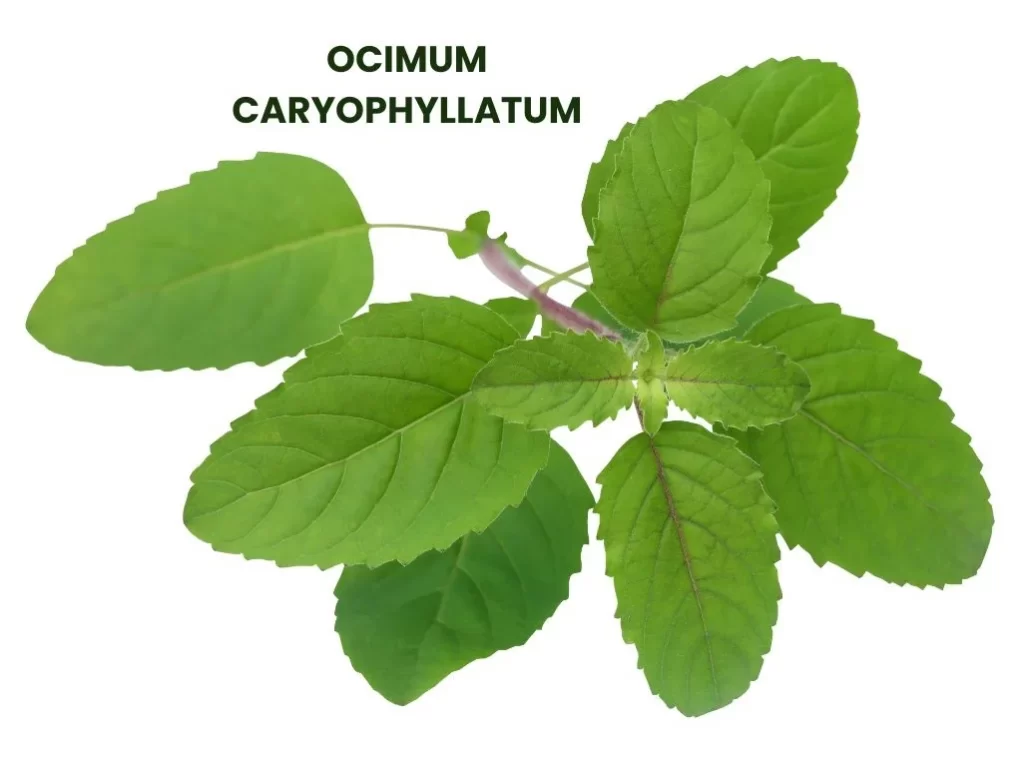Ocimum Caryophyllatum, commonly known as Dulal Tulasi, is a medicinal plant recognized for its therapeutic properties in treating conditions related to the urinary organs, spermatorrhoea, gonorrhoea, and blood dysentery.

SOURCE INFORMATION
Scientific Classification
- Kingdom: Plantae
- Clade: Angiosperms
- Clade: Eudicots
- Order: Lamiales
- Family: Lamiaceae
- Genus: Ocimum
- Species: O. caryophyllatum
Origin and Historical Facts
- Native Region: The plant is native to tropical and subtropical regions, commonly found in India and Southeast Asia.
- Historical Usage: Ocimum Caryophyllatum has been used in traditional medicine for centuries, particularly in Ayurveda, for its benefits in treating urinary and reproductive system disorders.
CLINICAL APPLICATIONS
- Spermatorrhoea: Effective in treating involuntary discharge of semen.
- Gonorrhoea: Particularly beneficial in the early stages of the infection.
- Haematuria: Helps reduce blood in the urine.
- Blood Dysentery: Assists in treating dysentery with blood in the stool.
KEY CHARACTERISTICS
- Antimicrobial: Helps fight infections in the urinary tract.
- Anti-inflammatory: Reduces inflammation in the urinary organs.
- Diuretic: Promotes urine production, aiding in the treatment of urinary infections and conditions.
DETAILED ORGAN SYMPTOMS
URINARY ORGANS
- Frequent Micturition: Increased urge to urinate frequently.
- Extreme Burning During Urination: Intense burning sensation while urinating, often associated with infections.
- Passage of Pus with Urine: Indicates an infection in the urinary tract, often seen in gonorrhoea.
- Haematuria: Presence of blood in the urine, suggesting a serious underlying condition affecting the kidneys or urinary tract.
- Action on Kidney, Bladder, and Urethra: Effective in treating infections and inflammations in these organs.
GONORRHOEA
- First Stage Symptoms: Excessive burning during urination mixed with pus, indicating an acute infection that Ocimum Caryophyllatum can help alleviate.
POTENCY OF CHOICE
- Mother Tincture: Effective for general and acute symptoms.
- Potencies: 3x and 6x are recommended for chronic conditions and specific symptoms.
Frequently Asked Questions
What conditions can Ocimum Caryophyllatum treat?
- Ocimum Caryophyllatum is used for treating spermatorrhoea, gonorrhoea, haematuria, and blood dysentery, particularly focusing on conditions related to the urinary organs.
How does Ocimum Caryophyllatum help with urinary infections?
- It has antimicrobial and anti-inflammatory properties that help fight infections and reduce inflammation in the urinary tract, easing symptoms such as burning during urination and frequent micturition.
What is the recommended dosage for acute infections?
- For acute infections, the mother tincture is recommended.
- For chronic conditions, potencies of 3x and 6x are effective.
Glossary of Difficult Words
- Spermatorrhoea: Involuntary discharge of semen without orgasm.
- Gonorrhoea: A sexually transmitted infection caused by the bacterium Neisseria gonorrhoeae.
- Haematuria: Presence of blood in the urine.
- Blood Dysentery: Dysentery with blood in the stool, often caused by bacterial or parasitic infection.
- Micturition: The act of urinating.
- Antimicrobial: Substance that kills or inhibits the growth of microorganisms.
- Diuretic: A substance that promotes the production of urine.
